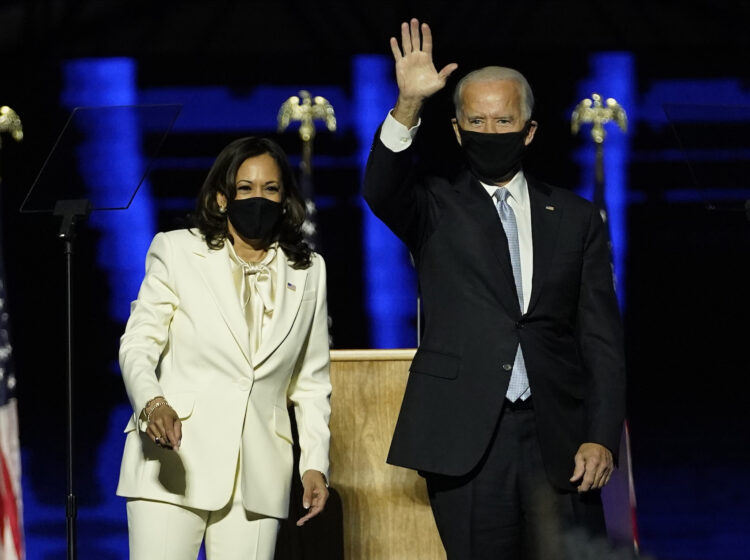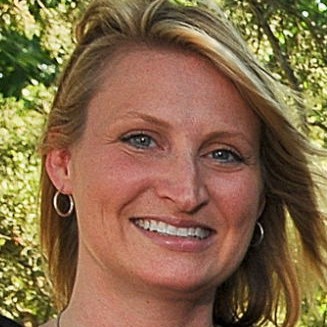
- Details
- By Levi Rickert and Valerie Vande Panne
One year ago, today, President Joe Biden took the oath of office to become the 46th President of the United States. In anticipation of the first year of the Biden-Harris administration, Native News Online on Wednesday interviewed Special Assistant to the President for Native American Affairs Libby Washburn (Chickasaw Nation of Oklahoma) in a video call.
This interview has been edited for brevity and clarity.
What do you see as the major success stories of the Biden administration as it relates to Indian country during the first year of the administration?
 Libby Washburn, Special Assistant to the President for Native Affairs (LinkedIn photo)We've had a lot of successes in this first year. And I think there's many and it's hard to pick one.
Libby Washburn, Special Assistant to the President for Native Affairs (LinkedIn photo)We've had a lot of successes in this first year. And I think there's many and it's hard to pick one.
Reforming the relationship with tribal governments has to be at the top. So almost a year ago, the President issued a presidential memorandum on tribal consultation, and strengthening the nation to nation relationship. And immediately, the entire federal government started changing the way they interacted with tribes and started reaching out, consulting.
Then we had more than 80 agencies create action plans, with more than half of them never consulting with tribes before. So, this really has a major impact throughout the entire federal government and every aspect of tribal governments and tribal ways of life.
We also changed the initial outreach. We had cabinet secretaries heading out to Indian Country. We've had the First Lady in Indian Country four times in this first year. We have held dozens of listening sessions on very important topics.
And then, it's impossible to not talk about the financial investments in Indian Country. It's massive. It's unprecedented. And we had the American Rescue Plan Act, where we put more than $32 billion into Indian Country with $20 billion in direct funding to tribes to help to recover from the pandemic. And then just two months ago, we got the infrastructure bill, where we have more than $13 billion indirect investments, with tribes having access to billions of more funds. This really is game changing for the tribes.
We've had a lot of others but those kind of rise to the top.
I would add the tribal nations conference, which actually was elevated to the tribal nations summit this past year. Will the administration have another one this year?
Yes. It was a campaign commitment to do an annual summit, and to reestablish the White House Council on Native American Affairs, which is definitely helping to move it forward on an interagency basis. We have all agencies working together on tribal issues. And then we have a big meeting at the end of the year, where the President comes and talks about the accomplishments for the year. So yes, that's an exciting thing that happened in 2021, as well.
Want more Native News? Get the free daily newsletter today.
During the Tribal Nation’s Summit, Secretary of the Interior Deb Haaland talked about Indigenous Knowledge. To my knowledge it is the first time a presidential administration has used the term. How did it become part of the Summit?
Actually, it was during in the White House Council earlier that comment came up. There was this body of scientific, Indigenous ecological knowledge, and the question was asked: what were we doing about it?
So, we gathered a group together from the White House Council and the Office of Science and Technology and the Council on Environmental Quality, spearheaded the effort and said, you know, we can do more here. We have a lot of agencies working on technology issues, but we want it to have a consolidated approach. And so, it took a couple months to bring everybody together with all the agencies but yes, it's a very exciting announcement that the President made this year.
It's definitely one of the bigger things that we announced at the summit
You mentioned the First Lady going to the four tribal nations. It was unprecedented. We never had a First Lady visit so many tribal nations in history. What's the genesis of that the Bidens’ attention to Native people?
It is a commitment that I've seen from the campaign and the transition. The President is committed to equity, and he wants tribes at the table. And the First Lady is incredible. And she has just shown such an interest in education in Native language. And it is something that she feels strongly about. In early December, she went to the Cherokee Nation and talked to them about their native language programs. And she just was amazed at what she saw. And so I think that, just across the board, you see a commitment from all agencies, all of the cabinet, but it's also strong within the White House.
There is a big concern in Indian Country about the Dakota Access pipeline and Enbridge Line 3 and oil and gas drilling in general. Can you speak a little bit to the plan that the administration has for addressing the pipelines and this issue?
We're in the process of doing an EIS (Environmental Impact Study) on the Dakota Access pipeline, and Enbridge Line 5 (in Michigan) as well. And we now have a confirmed assistant secretary at the Army Corps of Engineers, who has a proven track record on considering tribal interests. He is leading these efforts. I think this next year, we will see movement, we will see movement on EISs. And just know that it is a priority for the administration.
Something else that resonates across Indian Country is the call for the protection of the grey wolf. Please speak to the administration's plan for addressing that concern.
I do know that the Department of the Interior is looking at options. Assistant Secretary Brian Newland is focused on it. They are aware of the tribes’ concerns and they are continuing to look at different options of what they can do there. But, we appreciate the advocacy and the outreach, we have received lots of input from tribal leaders on this issue. And we welcome all of that, and hopefully we'll have more to talk about in the near term.
Indian country has been waiting for a new leader of the Indian Health Service. When do you think the administration will be able to share with us who that person will be or when they might be nominated?
It is a process to go through these nominations. We are working on it. It is a priority. I hope that we have something to tell you in the near term. You know, it is something that is being worked on many levels. But please know that we have a group of people working on this, and it is a top priority as well.
What would you like to add? What message do you really want to get out to Indian Country?
Well, I think what I'd like to highlight is, we have a lot of deliverables that we put out for the tribal nations summit. The work is continuing every day.
And even since that summit, in mid-November, we've been rolling out lots of new things. We had Chuck Sams confirmed as the director of the National Park Service. We have nominated our second Native American for federal district judge for the bench and she will be going through a confirmation process. We've announced millions and millions of dollars.
Right before Christmas, we announced $10 million for broadband in Indian Country. And today, the Army Corps of Engineers has announced millions and millions for tribal projects around the country, in particular, in Washington State, New Mexico, Alaska, and Arizona. The work continues all year long, every day. And everybody, all of the Natives who are in political positions are moving the agenda forward the best that they can.
Help us defend tribal sovereignty.
At Native News Online, our mission is rooted in telling the stories that strengthen sovereignty and uplift Indigenous voices — not just at year’s end, but every single day.
Because of your generosity last year, we were able to keep our reporters on the ground in tribal communities, at national gatherings and in the halls of Congress — covering the issues that matter most to Indian Country: sovereignty, culture, education, health and economic opportunity.
That support sustained us through a tough year in 2025. Now, as we look to the year ahead, we need your help right now to ensure warrior journalism remains strong — reporting that defends tribal sovereignty, amplifies Native truth, and holds power accountable.
 The stakes couldn't be higher. Your support keeps Native voices heard, Native stories told and Native sovereignty defended.
The stakes couldn't be higher. Your support keeps Native voices heard, Native stories told and Native sovereignty defended.
Stand with Warrior Journalism today.
Levi Rickert (Potawatomi), Editor & Publisher
